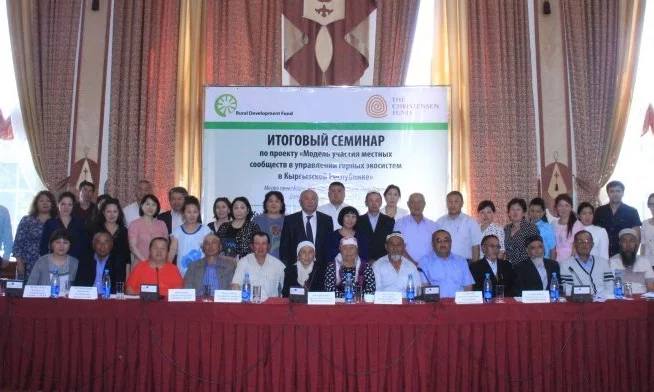The event was attended by representatives of the State Agency for Environmental Protection and Forestry under the PCR, the Department of Development of Forest Ecosystems and Specially Protected Natural Areas, the Department of Forest Management, Batken District State Administration, Batken and Kemin districts, international donor and nongovernmental organizations, and representatives of the State Agency for Environmental Protection and Forestry under the PCR.
The workshop presented the innovative model of forest ecosystem management with participation of local communities, which was developed by Rural Development Fund (RDF) with the support of The Christensen Fund together with SAEPF, local institutions and pilot communities. The model has been tested in two pilot communities in the south and north of the country: on the basis of Batken leskhoz with the participation of the pilot community "Alasan meikin zhamaaty" of Samarkandek AA, and on the basis of the State Nature Park (SNP) "Chon-Kemin" with the participation of the local community "Karool-Dobo meikin zhamaaty" of Kok-Oyrok AA.
The model promotes a holistic management and conservation concept, integrating the conservation of biocultural diversity with sustainable resource use by local communities. The uniqueness of the new co-management model from existing SFM approaches lies in the application of a holistic or eco-system approach to forest management; in the inseparability of forest ecosystem conservation from resource use; in the application of local traditional ecological knowledge; and in the involvement of the whole community in co-management, rather than individual, "privileged", forest users. For example, in the Batken pilot site, the local community "Alasan meikin zhamaaty" has developed into a sustainable institution that successfully manages the forest area without external support according to its Community Forest Ecosystem Management Plan. The Karool-Dobo meikin jamaaty established in the northern pilot site and the Chon-Kemin GPP have worked together to achieve the cessation of unauthorized logging in the allocated forest area.
The workshop participants were encouraged by the positive results and achievements of local communities in piloting the Model. Methodological tools of the Forest Ecosystem Co-management Model were also presented at the event, such as Guidelines for Landscape Assessment and Forest Inventory (for local communities), Guidelines for Joint Monitoring of Mountain Ecosystems, and a biodiversity database for leskhozes and PAs, among other materials developed by RDF.
The workshop presented the innovative model of forest ecosystem management with participation of local communities, which was developed by Rural Development Fund (RDF) with the support of The Christensen Fund together with SAEPF, local institutions and pilot communities. The model has been tested in two pilot communities in the south and north of the country: on the basis of Batken leskhoz with the participation of the pilot community "Alasan meikin zhamaaty" of Samarkandek AA, and on the basis of the State Nature Park (SNP) "Chon-Kemin" with the participation of the local community "Karool-Dobo meikin zhamaaty" of Kok-Oyrok AA.
The model promotes a holistic management and conservation concept, integrating the conservation of biocultural diversity with sustainable resource use by local communities. The uniqueness of the new co-management model from existing SFM approaches lies in the application of a holistic or eco-system approach to forest management; in the inseparability of forest ecosystem conservation from resource use; in the application of local traditional ecological knowledge; and in the involvement of the whole community in co-management, rather than individual, "privileged", forest users. For example, in the Batken pilot site, the local community "Alasan meikin zhamaaty" has developed into a sustainable institution that successfully manages the forest area without external support according to its Community Forest Ecosystem Management Plan. The Karool-Dobo meikin jamaaty established in the northern pilot site and the Chon-Kemin GPP have worked together to achieve the cessation of unauthorized logging in the allocated forest area.
The workshop participants were encouraged by the positive results and achievements of local communities in piloting the Model. Methodological tools of the Forest Ecosystem Co-management Model were also presented at the event, such as Guidelines for Landscape Assessment and Forest Inventory (for local communities), Guidelines for Joint Monitoring of Mountain Ecosystems, and a biodiversity database for leskhozes and PAs, among other materials developed by RDF.



As noted by Mr. A.O. Ormonov, Director of the Forest Ecosystems and Protected Areas Development Department of SAEPF SCPD, the RFF was ahead of the time and developed a new approach to collaborative forest management, which will be applied in reforming the forest sector of the country. He also noted the timeliness of RDF methodological developments and emphasized the importance of this approach in improving the forest sector and the welfare of local people.
RDF presented recommendations and proposals on effective involvement of local communities in forest management based on the experience gained and lessons learned and summarized that local communities should be gradually involved in forest ecosystem management and biodiversity conservation through capacity building, continuous awareness raising and ensuring equal partnership between leskhoz, local communities and local authorities.
RDF presented recommendations and proposals on effective involvement of local communities in forest management based on the experience gained and lessons learned and summarized that local communities should be gradually involved in forest ecosystem management and biodiversity conservation through capacity building, continuous awareness raising and ensuring equal partnership between leskhoz, local communities and local authorities.
